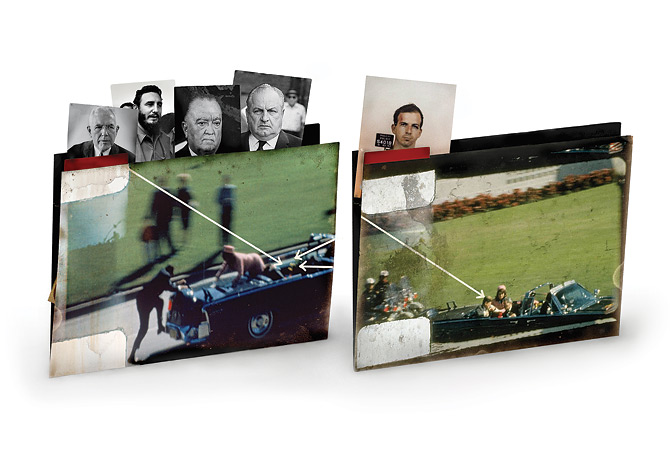
Bobby suspected his brother's assassination emerged from the plotting by Cuban exiles, the Mafia and the CIA to kill Castro. From left, CIA Director John McCone, Castro, FBI Director Hoover, who first informed Bobby of J.F.K.'s death, and New Orleans mobster Carlos Marcello. At right, Oswald.
Yes.
On Friday, Nov. 22, 1963, Robert F. Kennedy—J.F.K.'s younger brother, Attorney General and devoted watchman—was eating lunch at Hickory Hill, his Virginia home, when he got the news from Dallas. It was his archenemy, FBI chief J. Edgar Hoover, of all people, who phoned to tell him. "The President's been shot," Hoover curtly said. Bobby later recalled, "I think he told me with pleasure."
For the rest of the day and night, Bobby Kennedy would wrestle with his howling grief while using whatever power was still left him to figure out what really happened in Dallas—before the new Administration settled firmly into place under the command of another political enemy, Lyndon Johnson. While the Attorney General's aides summoned federal Marshals to surround R.F.K.'s estate (they no longer trusted the Secret Service or the FBI)—uncertain of whether the President's brother would be the next target—Bobby feverishly gathered information. He worked the phones at Hickory Hill, talking to people who had been in the presidential motorcade; he conferred with a succession of government officials and aides while waiting for Air Force One to return with the body of his brother; he accompanied his brother's remains to the autopsy at Bethesda Naval Hospital, where he took steps to take control of medical evidence, including the President's brain; and he stayed coiled and awake in the White House until early the next morning. Lit up with the clarity of shock, the electricity of adrenaline, he constructed the outlines of the crime. Bobby Kennedy would become America's first J.F.K. assassination-conspiracy theorist.
The President's brother quickly concluded that Lee Harvey Oswald, the accused assassin, had not acted alone. And Bobby immediately suspected the CIA's secret war on Fidel Castro as the source of the plot. At his home that Friday afternoon, Bobby confronted CIA Director John McCone, asking him point-blank whether the agency had killed J.F.K. (McCone denied it.) Later, R.F.K. ordered aides to explore a possible Mafia connection to the crime. And in a revealing phone conversation with Harry Ruiz-Williams, a trusted friend in the anti-Castro movement, Kennedy said bluntly, "One of your guys did it." Though the CIA and the FBI were already working strenuously to portray Oswald as a communist agent, Bobby Kennedy rejected this view. Instead, he concluded Oswald was a member of the shadowy operation that was seeking to overthrow Castro.
Bobby knew that a dark alliance—the CIA, the Mafia and militant Cuban exiles—had formed to assassinate Castro and force a regime change in Havana. That's because President Kennedy had given his brother the Cuban portfolio after the CIA's Bay of Pigs fiasco. But Bobby, who would begin some days by dropping by the CIA's headquarters in Langley, Va., on his way to the Justice Department, never managed to get fully in control of the agency's sprawling, covert war on Castro. Now, he suspected, this underground world—where J.F.K. was despised for betraying the anti-Castro cause—had spawned his brother's assassination.
As Kennedy slowly emerged from his torment over Dallas and resumed an active role in public life—running for U.S. Senator from New York in 1964 and then President in 1968—he secretly investigated his brother's assassination. He traveled to Mexico City, where he gathered information about Oswald's mysterious trip there before Dallas. He met with conspiracy researcher Penn Jones Jr., a crusading Texas newspaperman, in his Senate office. He returned to the Justice Department with his ace investigator Walter Sheridan to paw through old files. He dispatched trusted associates to New Orleans to report to him on prosecutor Jim Garrison's controversial reopening of the case. Kennedy told confidants that he himself would reopen the investigation into the assassination if he won the presidency, believing it would take the full powers of the office to do so. As Kennedy adviser Arthur Schlesinger Jr. once observed, no one of his era knew more than Bobby about "the underground streams through which so much of the actuality of American power darkly coursed: the FBI, CIA, the racketeering unions and the Mob." But when it came to his brother's murder, Bobby never got a chance to prove his case.